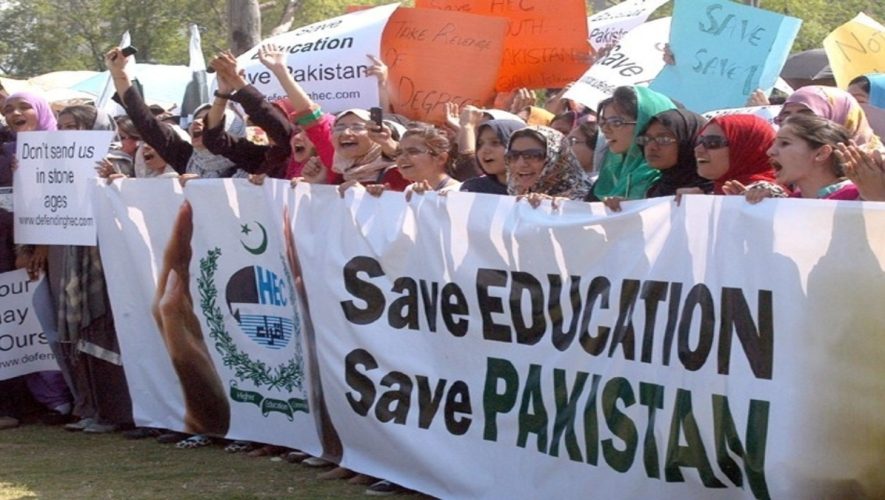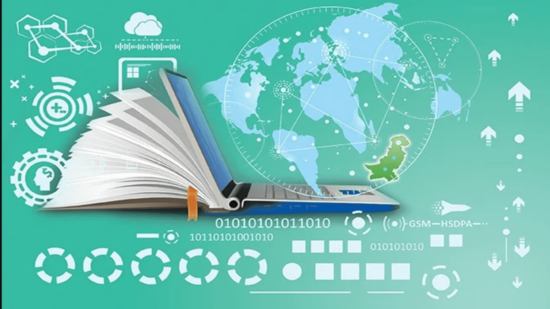Education is the road to national development. It promotes economic development and consequently people become prosperous and play their respective roles in the overall national development. However, The education system of Pakistan despite of towering claims and plans faces the following problems which are critically analyzed below;
1. Lack of Uniformity
The system of education in Pakistan according to Iqbal (1981) is not based on uniform principles. Different systems of education are simultaneously working in the country. The curriculum is also not uniformed which has given birth to different schools of thoughts. For example there is a world of difference between the attitudes of students coming out from the public educational institutions, Deeni Madaris and the few private elite institutions. This trend has accelerated the pace of polarization in the society which is among the major problems of education in Pakistan.
According to Zaki (1989) this is the result of divisive Pakistani education system. This system has created a huge gap among the nation and even has deeply penetrated into the cultural veins of the nation. The recent wave of terrorism and the increasing sectarian division are the logical consequences of this divided system of education. As a result of this current polarized system of education there has occurred a great social division in the society on political, social and economic grounds rather than unity among the people which is cutting knee deep the ideological and social foundation of the nation leading towards further divisions on linguistic and regional grounds which can potentially damage the social cohesion and fabric of the society.
2. Education without Direction
A sound education system is essential for every nation of the world. Every nation develops its generation on the basis of vigorous training and education on social, political, economic and ideological grounds. Pakistani education system due being directionless and weak has not been able to develop and guide its people on sound political and social grounds. There is lack of cohesion in the system and it is more prone towards general education which does not bring any skilled manpower to the market. Resulting there is increasing unemployment. This situation may promote sense of deprivation among the masses. Due to this there is cultural and political unrest in the society. Besides, there is lack of educational opportunities for science and technology. In this way the development of thinking, reasoning and creativity of students is not being polished.
3. Outdated Curricula
Curriculum is the tool through which the goals of education are achieved. The curriculum of education in Pakistan does not meet the demands of the current times. It is an old and traditional curriculum which compels the learners to memorize certain facts and figures without taking into consideration the reality that education is the holistic development of an individual. It places much emphasis on the psychology of the learner as well which cannot be negated in the process of teaching and learning. The objectives of education must be developed the psychological, philosophical and sociological foundations of education. The present educational curriculum of Pakistan does not meet these modern standards of education and research. Hence this curriculum is not promoting the interest of the learner for practical work, research, scientific knowledge and reflective observation, rather, it emphasizes on memory and theory.
4. Lack of Professional Development of Teachers
Teaching is a challenging job and its training is essential for quality performance. There is lack of training opportunities for teachers in Pakistan. Although there various teacher training institutes in the country. These institutes are either not well resourced or being poor run due to lack of fund and trained human resource such trainers and administrators. There are no proper training standards in the available training institutes around the country. Most of the training institutes have been closed down due to lack of funds. The courses being run in the teacher education intuitions are outdated and very traditional which does not enhance the skills, motivation and quality of teachers.
5. Lack of Quality Teachers
Teacher is the backbone of education system. The quality of teachers in Pakistani schools is deplorable. According to a UNESCO report, the quality of the teachers and instruction in schools is of low quality. This situation is grimmer in remote parts of Punjab, Sindh and Baluchistan where even there are no teachers available in schools. Research has found that teachers do not use new methods and strategies of teaching and learning. Majority of the teachers do not know about lesson planning which renders them incapable of dealing with various problems in the process of teaching and learning.
Teachers encourage cramming of the materials by students. Students do not know the use of libraries in educational institutions. Thus the reading habits are decreasing among the students. Teachers are highly responsible for all this mess. It is their professional responsibility to guide the students towards book reading. Teachers rely on lecture methods which do provide an opportunity to students to participate in the process of education as active member. They only note does the information and memorize this just to pass the examination. Thus students are evaluated on the basis of memorization of facts and information rather than performance.
6. Alarming Dropouts
Due to lack of effective management of schools there is lack of discipline in schools and other educational institutions which leads to high scale dropouts of students. This trend has increased to such an extent that there are now 40 lac students out of school due to drop out in Pakistan. This trend according to Hayes (1989) is due to partly the punishment in schools, poor motivating or unattractive school environment and partly due to weak parenting on the part of parents. Child labor and poverty is also one of the reasons for dropouts form schools. An estimated 30 percent of children enrolled in primary education reach to the matric level. This trend in Pakistan has added to the low literacy rate as well.
7. System of Examination
Problems of education in Pakistan also include faulty system of examinations. Examination is the evaluation of student’s learning. It should be based on qualitative and quantitative techniques to comprehensively evaluate the performance of students. The standards must ensure validity and reliability of the procedures used in the assessment process. The basic aim of assessment is to evaluate the performance of students. The examination system of Pakistan is not only outdated but it also does not have the quality to evaluate the performance of learners comprehensively.
The examination system of Pakistan tests only the memory of students. It does not evaluate them in all aspects of learning. Moreover, the examinations are influenced by external and internal forces which have encouraged the trend of illegal practices such as unfair means. As a result of this the examination system promotes rote learning and cramming which negates the role of high intellectual power of learners in the education process such as critical thinking, reflection, analytical skills and so on. It does not measure the actual achievements and performance of students.
8. Poor Supervisory Standards
The role of supervision is to explore weaknesses or faults of teachers and showing a harsh treatment in form of transfers to remote areas or even termination from services. Supervision is the monitoring of teaching and learning. Through effective supervision techniques the process of teaching and learning could be improved. The system of school supervision is aimless. There is not only lack of supervisory activities in schools but the process of supervision itself does not bring any positive results for teachers and students. Supervision system is concerned with controlling and harassing the teachers rather than providing help and guidance for improvement of performance.
9. Internal and External Influences
Education system in Pakistan is not free from external and internal influences. Externally the system has been made hostage to political interference and internally it is plagued by the bureaucratic manipulations. There is a greater favoritism and nepotism in matters of transfers, appointments and promotions. Due to this the basic infrastructure of the education system in Pakistan has affected.
10. Lack of Resources
Education resources such as books, libraries and physical facilities are important for smooth running of educational process. There are despairingly no facilities of books, libraries and reading materials in all educational institutions of the country. Besides, there are overcrowded classrooms, inadequate teachers and ill-equipped laboratories. This entire grim situation has resulted in a despair and low standard education system.
11. Policy Implementation
Since the inception of Pakistan a number of education policies were created. There has been lack of political will on the part of successive government to implement the policies vigorously. The policies were highly ambitious but could not be implemented in true letter and spirit. There has been problem of corruption, lack of funds and gross inconsistency in successive planning on the part of various political regimes in Pakistan. Moreover, in the overall policy formulation teachers have been ignored. They are regarded as unimportant element which has led to alienation between the teachers and the system of education.
12. Low Budgetary Allocation for Education
Finance is considered the engine of any system. The education system of Pakistan has been crippled mainly due to scarce finance. The successive governments have been giving less than 2.5 percent budget to the education sector which is not sufficient for the growing educational needs of the nation in the present changing times. In many of the developing regional countries such as Sri Lanka and Bangladesh the budgetary allocation for education has increased. But in Pakistan it is declining day by day. According to International Crisis group, Pakistan is amongst the 12 countries in the world that spent less than 2 percent of their GDP on education sector. With this insufficient budgetary allocation, the country is hardly going to meet the targets of universalization of primary education as a signatory to the Dakar Conference’s MDG goals by 2015 and onward.
13. Corruption
Among other causes, corruption is the main contributing factor which has deeply affected the education system of Pakistan. There is a weak system of check and balances and accountability which has encouraged many criminal elements to misappropriate funds, use of authority illegally and giving unnecessary favors in allocation of funds, transfers, promotions and decision making. According to Transparency International, Pakistan is included in the list of the most corrupt countries of the world. Due to low salaries, teachers in search of decent life standards and to keep their body and soul together attempt to unfair means in the examination and matters relating to certificates, degrees and so on.
Courtesy: IJERE
OTHER RELATED POSTS



